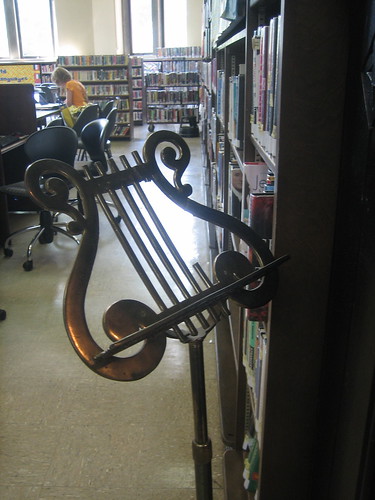Hi — I just got back from a short trip to New York City (real short, get in Wednesday and go home Friday) but I did manage to see five libraries. I know it’s been a while since I did a library recap but here’s a few links to photos and stories. NYPL has a lot going on lately in both good and bad ways. I’m always interested in the branch/main division personally and as I was on two long walks around Manhattan [1, 2] I tried to stop into as many libraries as I passed.
The first thing you notice when you’re walking is that the libraries have big blue banners hanging in front of them. This means you can see them from a block or two away and know you’re in the right place. So armed with that information and this library location mashup, I ventured in to the city. Here are the libraries I went to.
- Jefferson Market Branch – this library is housed in a former women’s detention center and has a rich sense of history as well as an incredible building generally. Like many historic buildings that become libraries, the services are a little… smushed in there. There’s a big reference desk on the main floor that is empty and stacked with boxes and the reference librarian is actually in the basement with the reference collection. He seemed happy there. Outside there is an incredible set of gardens that were a joy to walk through.
- Muhlenberg Branch – this library had just opened for the day and it was totally full of people. There was some confusion about how much of the library was open [see sign] and I just wanted to sit someplace cool and check my email using my laptop but couldn’t find an easy place to do that.
- I kept walking and wound up at Bryant Park outside the big main NYPL research library. I ate lunch in the park and went inside to do a little work. The periodicals room has the best wifi, but no outlets, a way to I guess keep people’s visits to a reasonable time limit. I ran afoul of the wifi filters, not on purpose. You can see the page that was blocked. Graphic subject matter, NO graphic imagery.
- The next day I went to the Tompkins Square Branch which is right near my friend Jenna’s place. It’s a lovely Carnegie building and was busy and full of folks. It had a really large Russian Language collection.
- Then I wandered on to go by the Braille and Talking Book Library which had been closed the last time I walked by it. I was sort of interested whether there was any public information about the recent decision concerning the class action lawsuit that the National Federation for the Blind brought against Target concerning web site accessibility for businesses that sell things online. I enjoyed my time in the library. It’s brightly lit and has large easy to read signage and finding aids. It drove home the point that I tend to belabor which is that making things more usable really benefits everyone, not just whatever population happens to need accomodation. I liked having a bright library with wide low shelves and simple signage, who wouldn’t?
That wraps up my short tour of some Manhattan libraries in the NYPL system. Next time I’m in town I swear there will be meetups and beer drinking.
